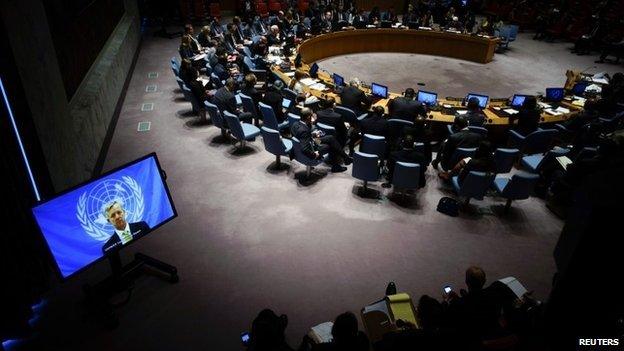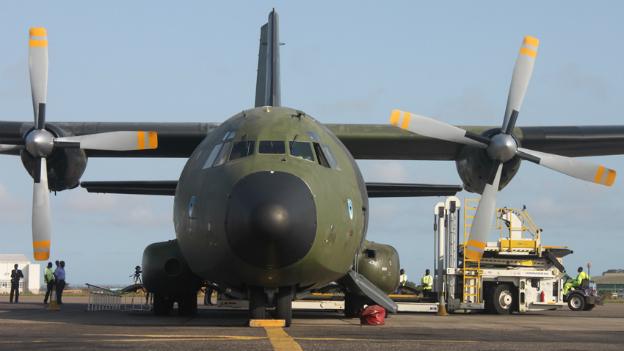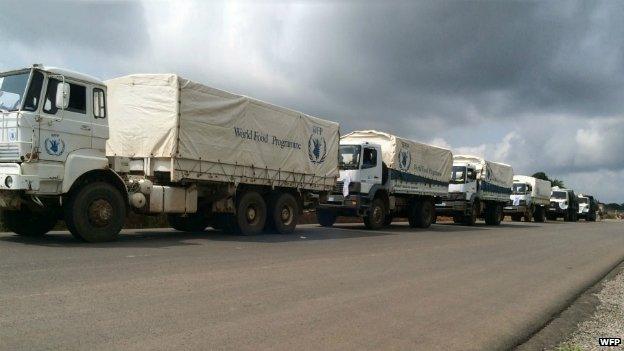Ebola crisis: Why is the UN response taking so long?
- Published

American Tony Banbury is now leading the UN Ebola mission but it took months for the body to be set up
Ebola has only really hit the big international headlines in the last few weeks. During that same period, readers may well have also heard about the various aid agencies which are helping out.
So, a not unreasonable impression may have formed - that there's a big problem, but it's being dealt with. That there are people dying, but that help is out there to save the others.
Well, I'm afraid it's not like that at all.
There are some extremely brave African and international health workers trying to stop the Ebola epidemic.
The Africans among them - the Liberians, the Sierra Leoneans , the Guineans - have been working for six months.
The international staff, led by the medical aid agency Medecins Sans Frontieres (MSF) - tend to go in for shorter, but still exhausting stretches of time.
These medics have been warning for months that Ebola is out of control. In fact, they've been screaming it from any platform they can.
"Help", they basically said. "Help, please, we can't cope on our own."
'Lumbering into action'
But it is only now, four or six months later, that the great machine of the so-called "international community", the United Nations, is lumbering into action.
Kofi Annan: "The international community... we didn't need to take months"
I know this machine well. I've seen it in other disaster zones - in Haiti, in Somalia. I have many friends inside the machine - well-meaning UN officials, peacekeeping soldiers and medics.
Most readers will have seen and heard images of people like these in action - running clinics, bringing security, saving people.
So it's quite reasonable to think that this is what they're doing all the time. But the machine doesn't work like that. The reality is very different.
Imagine trying to set up and run a medium sized multinational company. But then imagine trying to set it up in countries with very bad roads and electricity supply, dodgy telecommunications and mostly badly-educated populations.
Sierra Leone boy: "I've lost five members of my family"
And, above all, imagine trying to set this up this company in countries where it can be highly dangerous to even touch a fellow human being if they are in the infectious stage of the Ebola disease.
Logistical nightmare
UN aid workers are not saints or superhumans.
To establish your "multinational company" you have to do some mundane tasks.
You have to bring in people from all over the world. Then you have to feed and house them. You have to get them cars and desks and telephones.
You have to make sure each bit of the machine knows what the other bits are doing.
And that's before your aid workers can move to the front line and actually do their job.

The UN Ebola mission sent its first plane to West Africa this week but it was not carrying medical supplies

UN bodies like the WFP have been active in the Ebola response but UNMEER is playing catch-up
This week I saw the first plane that the UN Mission for Ebola Emergency Response (UNMEER) sent from Ghana to the Ebola zone. It wasn't carrying hospital equipment or the protective clothing that medics need.
It was carrying poles and canvas to construct temporary warehouses - to put the hospital gear and protective clothing in at some later date.
Now, it would be most unfair to say that the whole of the UN has been inactive for all these months. Some of the big UN agencies like the World Food Programme or Unicef have been very busy on the front lines.
But the UN Ebola response office, the head, the brains of the great machine, is only just beginning to get into gear.
In fact, because the idea to form it was made during the UN General Assembly and so many UN members were around in New York, UNMEER itself was formed in record time for a UN agency - a matter of days.
What took a long time was deciding to set it up at all.
Incredible challenge
The managing director of the new "multinational", UNMEER, is a straight-talking American, Tony Banbury, who doesn't hide the enormity of his challenge.
But I've seen some of the lists of what he needs to make his "company" work.
The BBC's Mark Doyle says the number of Ebola cases is doubling every month
Quite apart from the staff, he needs hundreds of cars, hundreds of flat-bed trucks to move stuff around, countless ambulances, and ten heavy lift helicopters.
He needs 3,000 tonnes-worth of protective clothing for medics treating the infectious patients, every month, and four tonnes-worth of body bags per month.
All these things have to be in the right places, at the right times. He doesn't have them yet, or anywhere near.
And here's how Tony Banbury puts it.
The man in charge of stopping what the World Health Organization has described as the most serious health emergency of modern times says this: "I need everything. I need it everywhere. And I need it super-fast."